Sudan
Hungry, vulnerable, and scarred by more than seven months of relentless conflict in Sudan, 15 lions were evacuated from the outskirts of the capital to the east of the country by the Four Paws organization, during an ultra-sensitive mission in a war zone.
Lions, hyenas, wildcats, birds: in all, "nearly 50 animals" were evacuated last week by Four Paws from a reserve near Khartoum managed by the Sudan Animal Rescue Center, the Austrian association said in a press release.
An hour's drive south-east of Khartoum, the Al-Baguir reserve is "near a military base that is fighting", Osman Salih, founder of the Sudan Animal Rescue Center, told AFP.
"Many shells and bombs fell on the refuge, damaging the infrastructure and injuring some of the animals", continues the 39-year-old engineer.
The war between the military and paramilitaries that has been raging in Sudan since April 15 has already claimed more than 10,000 lives, according to the NGO Armed Conflict Location & Event Data Project (Acled), an estimate considered to be grossly underestimated.
Al-Baguir's animals have not been spared. In seven months, "we lost seven lions, most of them to disease", says Mr. Salih, referring to the case of a lioness "fatally wounded by a stray bullet and then devoured by her fellow lions".
"Unusual behavior," Amir Khalil, the Four Paws veterinarian in charge of the evacuation mission, told AFP.
- "Weakened and traumatized" -
"The animals are very weakened physically and suffering from serious health problems. Psychologically, they are all traumatized", assures the Egyptian-Austrian vet, who went to Sudan to negotiate the transfer.
Today, however, he has reason to rejoice. His protégés - 15 lions, four hyenas, six wild cats, and numerous birds and reptiles - have arrived safely in the east of the country, where they are being cared for by the authorities.
This mission, explains Mr. Khalil, is "among the most important and dangerous" carried out by his organization, which is not involved in conflict zones for the first time.
To leave, the animals had to be injected with sedatives to transfer them from their enclosures to the transport cages. Once the beasts, birds, and other vertebrates were aboard the truck, the convoy sped off in the direction of the Oum Barona National Park, 140 kilometers southeast of al-Baguir, where the animals are being temporarily cared for.
A "highly planned rescue mission", with numerous "security measures" and above all "communications with both parties to the conflict", says Dr. Khalil.
Four Paws had previously carried out missions in Libya during the Arab Spring and in the Palestinian territory of Gaza after the 2014 war. In 2017, the organization rescued a lion and a bear from a zoo in Mosul, a former stronghold of the Islamic State (EI) organization in Iraq.
- "Little lion cubs" -
The operation in Sudan proved perilous and "extremely costly", Mr. Salih stresses. But it had become indispensable.
"We worked very hard to provide food and water during the war, but it was very complicated," explains the engineer, from a country where running water and electricity are lacking and food is increasingly scarce.
This is not the first time his wild animals have been evacuated. In 2020, Mr. Salih discovered them starving in the Khartoum Zoo. He then launched a campaign to save them, opening the Al-Baguir refuge to take them in.
"I even personally took care of Moody and Mina when they were still cubs," he recalls.
Last year, Al-Baguir volunteers gave the AFP a tour of their reserve, recounting how they took turns feeding each of the felines every day.
This commitment is all the more important given that the number of African lions in the world has fallen by 40% in three generations, according to the World Wildlife Fund (WWF). There are now just over 20,000 in the wild, including a handful in Sudan.
At Oum Barona Park, "the animals need a few days to recover", says Amir Khalil.
They will then be transferred to another Sudanese park, Dinder National Park, near the border with Ethiopia. And those in need of further care may embark on a new journey.
"Probably to Jordan", says the vet.



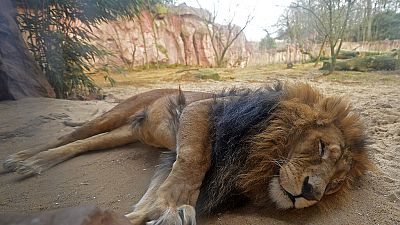

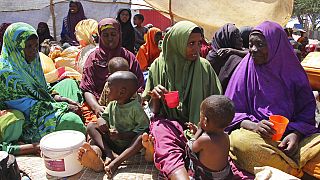

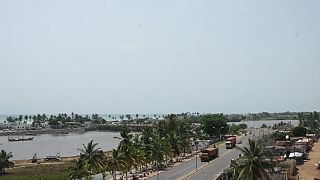
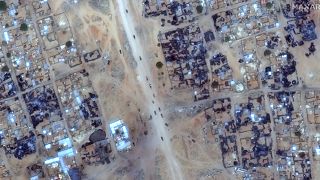
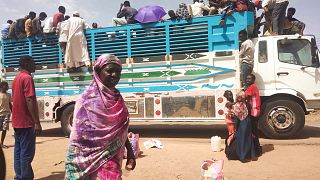
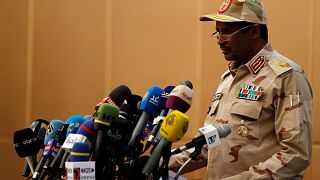



00:47
Ghana: President Mahama suspends Chief Justice Gertrude Torkornoo
Go to video
Police rescue 33 West Africans from a human trafficking scam in Ivory Coast
Go to video
Pope Francis' funeral scheduled Saturday April 26
02:35
Sudanese Refugee Children Find Hope in Libyan School
Go to video
Al-Qaida-linked militants attack a strategic town in Somalia
Go to video
Trump administration threatens Harvard over foreign student visas and protest ties